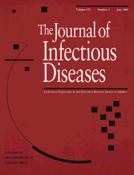-
Views
-
Cite
Cite
M. A. Gomez Morales, C. M. Ausiello, F. Urbani, E. Pozio, Crude Extract and Recombinant Protein of Cryptosporidium parvum Oocysts Induce Proliferation of Human Peripheral Blood Mononuclear Cells In Vitro, The Journal of Infectious Diseases, Volume 172, Issue 1, July 1995, Pages 211–216, https://doi.org/10.1093/infdis/172.1.211
Close - Share Icon Share
Abstract
Cryptosporidium parvum preparations were studied for their ability to induce specific proliferation of cultured human peripheral blood mononuclear cells (PBMC) from both immunocompetent and human immunodeficiency virus- positive persons, some of whom had transient cryptosporidiosis. The proliferation of PBMC from sensitized donors induced by C. parvum preparations was due mainly to antigen-specific rather than nonspecific activation, as indicated by the kinetics of the proliferative response, inhibition of the PBMC proliferation by a monoclonal antibody directed against major histocompatibility complex class II-specific HLA-DR molecule, and lack of proliferation of umbilical cord blood PBMC. PBMC from immunocompromised patients did not proliferate in response to C. parvum-specific antigens. The supernatants ofPBMC obtained from immunocompetent donors contained interleukin-10 and interferon (IFN)-γ after PBMC were exposed to C. parvum preparations. High IFN-γ values were found in patients who had recovered from cryptosporidiosis, suggesting that IFN-γ plays a role in resolving this infection.
- recombinant proteins
- cryptosporidiosis
- monoclonal antibodies
- antigens
- cryptosporidium parvum
- hla-dr antigens
- immunocompetence
- immunocompromised host
- immunologic deficiency syndromes
- interferons
- interleukin-10
- major histocompatibility complex
- infections
- kinetics
- viruses
- human leukocyte interferon
- umbilical cord blood
- peripheral blood mononuclear cell
- molecule
- oocysts
- donors






